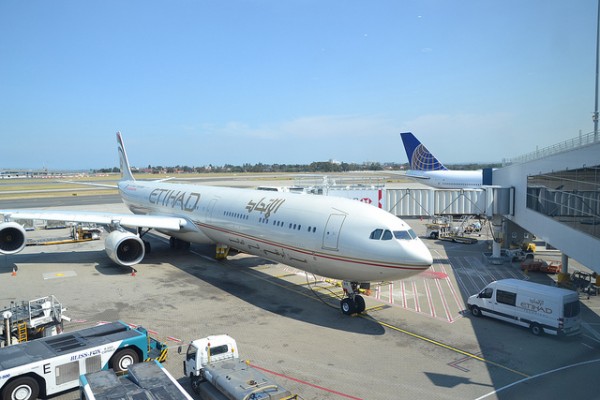
Photo: Simon_sees/Flickr/CC BY 2.0
Anyone with even a passing interest in international aviation has heard of the Open Skies debate between the American legacy carriers and the luxury carriers of the Arabian Gulf. Trevor and I even debated and discussed the situation on the Saverocity Observation Deck Podcast. While there are no clear answers, there are ultimate winners and losers. As the debate rages on, one major constituent group that could lose are the flying consumers.
Because the American legacy carriers are accusing the Arabian carriers of receiving illegal subsidies that have hurt the growth opportunities of the legacy carriers, there could be real and long-lasting repercussions to the accusation. Whether or not the arguments are substantiated in either direction, the damage of the claims alone could create bigger problems for in the long run. Could the Open Skies debate ultimately hurt travelers? Absolutely. Here are three ways travelers could be affected.
The Open Skies may hurt codesharing agreements
If the Open Skies debate shakes up the American air space, the first place it could hurt is within the major airline alliances and their codesharing agreements. Qatar Airways, one of the three Arabian airlines in question, joined oneworld in 2013. In addition, Etihad Airways has a significant stake in oneworld member Airberlin and SkyTeam member Alitalia, in addition to starting their own alliance late last year. If the Open Skies debate turns any more sideways, these could be the first thing to come into question.
Should the Open Skies debate come to a head and action by either side is taken, the first thing that could disappear are codesharing and alliance agreements between the airlines. As a result, fliers access to the Arabian carriers could be limited to strictly booking directly with them. Or, even more, the Arabian carriers could follow Etihad and opt to create their own alliances, locking out American airlines.
The Open Skies debate could hurt award availability
In this scenario, the codeshare and alliance agreements would be the first domino to fall. One of the biggest losses that would be felt by the consumer comes from lost award booking availability on the Arabian carriers.
Today, many travelers enjoy the benefits of flying some of the best premium class products on points and miles – thanks, in part, to alliance agreements. Under this situation, the Arabian carriers could pull their support for reciprocal award agreements with their airline partners, effectively killing award opportunities with points from the American carriers. While this wouldn’t necessarily hurt the Arabian carriers, the award flier based in the United States could be directly affected.
The Open Skies debate could hurt growth in the United States
Finally, each of the Arabian carriers have been growing across the United States in leaps and bounds, increasing their destinations every year. Earlier this month, Etihad announced the first American destination for their super-luxurious Residence first class product would be John F. Kennedy International Airport in New York. That could all end, however, depending on where the Open Skies debate goes.
If the Open Skies debate ends in favor of the American carriers, it could mean that growth among the Arabian carriers in the United States would come to a halt, reducing the international outlets to the major international airports. While this is something that the American legacy carriers have been charging forward on, the lack of competition could drive prices up for everybody. If nothing else, deregulation has taught us that the lack of competition is not necessarily a good thing.
While we don’t know where the Open Skies debate will go, the first rule of physics reminds us that for every action, there is an equal and opposite reaction. The reaction could ultimately do more harm than good – but what that means has yet to be seen.